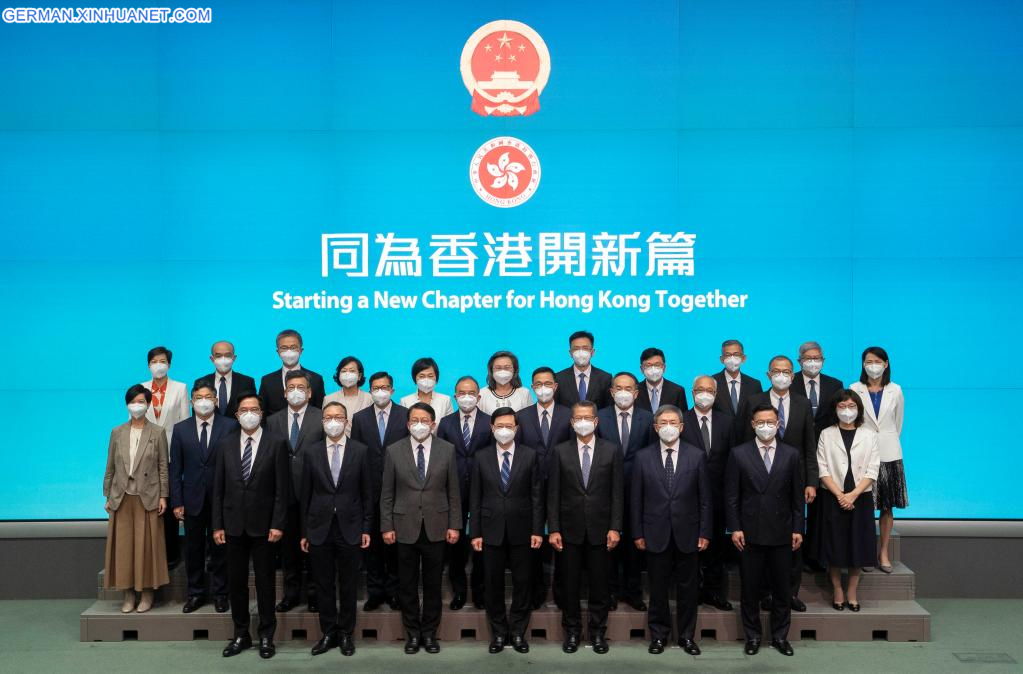Beijing unveils the next officials to govern Hong Kong
John Lee released on Sunday his cabinet picks to help him lead Hong Kong, including four pro-Beijing lawmakers and four officials sanctioned by the United States.

Over the weekend, China unveiled the 26-member team of top officials that will govern Hong Kong, as incoming leader John Lee Ka-chiu (李家超 Lǐ Jiāchāo) is set to take the mantle from incumbent Carrie Lam (林鄭月娥 Lín Zhèng Yuè’é) on July 1.
Lee, widely expected to prioritize national security issues, has picked seven new top officials from outside the government, four of which are pro-Beijing lawmakers. Of the cabinet, four have also been sanctioned by the United States (including Lee himself) for “undermin[ing] Hong Kong’s autonomy and democratic processes.”
- “The next five years is a critical time for Hong Kong to move from stability to prosperity,” Lee said on Sunday.
Here are some of the key leadership roles of those either incoming or continuing their positions (* marks those sanctioned by the U.S.):
- John Lee*, 64, will become the new chief executive. The former deputy leader of Hong Kong and an ex-security official was elected through a controversial rubber-stamp election process early last month.
- Eric Chan Kwok-ki (陳國基 Chén Guójī)*, 63, will remain as chief secretary and Lee’s deputy in the No. 2 position. He previously served as the immigration chief from 2011 to 2016.
- Paul Chan Mo-po (陳茂波 Chén Màobō), 67, will remain in his post as financial secretary in a sign of stable economic policy. He has held the position since 2017 and managed the recession set off by the anti-government protests in 2019 and the city’s strict COVID-zero policy that has been in place since the start of the pandemic.
- Paul Lam Ting-kwok (林定國 Lín Dìngguó), 54, will join the cabinet as secretary for justice. He previously served as the vice-chair and chairperson of the Hong Kong Bar Association, and has been a deputy judge of the city’s high court since 2015. In 1989, he participated in assemblies supporting the pro-democracy movements in China; 20 years later, he joined as a member of Hong Kong’s police watchdog, which largely stamped out the 2019 protests.
- Chris Tang Ping-keung* (鄧炳強 Dèng Bǐngqiáng), 56, will remain as secretary for security. He joined the police force in 1987 and became the commissioner of police in 2019, the year that the anti-government protests began in Hong Kong. He was then promoted to become the secretary for security in 2021.
- Lo Chung-mau (陸崇茂 Lù Chóngmào), 61, will join as Secretary of Health. He has been a staunch supporter of China’s COVID-zero strategy and has led referrals of the violence in the anti-government movement as a “critical illness.”
Amid its congratulatory wishes, the State Council’s Hong Kong and Macau Affairs Office (HKMAO) issued a statement with five expectations for Lee’s cabinet — instructions that were not imparted to Carrie Lam when she took office, per Bloomberg:
- Correctly implement “one country, two systems.”
- Address issues of immediate concerns for Hong Kong residents, such as housing.
- Promote social development.
- Integrate Hong Kong with the nation’s development.
- Consolidate and improve Hong Kong’s international competitiveness.
Lee’s transition into power comes at the same time as the 25th anniversary of Hong Kong’s return to Chinese rule, an event that Xí Jìnpíng 习近平 himself might attend. The government has spared no expense to create a celebratory atmosphere: The event has its own website, which shows a light show, an online exhibition, and even a theme song complete with a music video.
- In line with COVID zero, top officials attending celebratory events will quarantine at designated hotels for one day under a revised “closed-loop” arrangement.
- State mouthpiece People’s Daily also recently published an article highlighting Xi’s “care” for Hong Kong over the decades.






